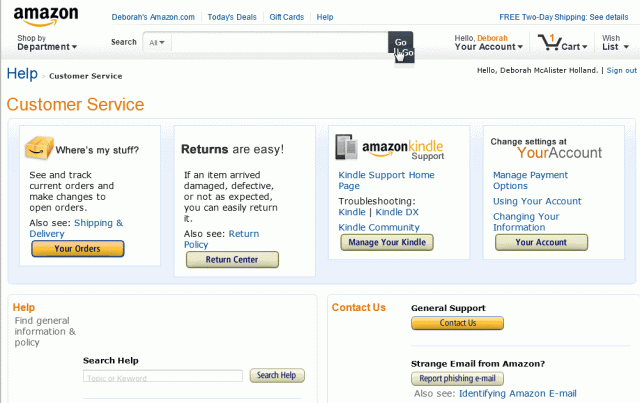There are several scam artists on Amazon.com who are stealing whole books, changing a title and a name or two inside, and reselling the works as their own. C.J. Cherryh, Robert Heinlein, Arthur C. Clarke, and many others are victims. It’s been happening for some time, and writers were becoming increasingly unhappy with the slow response and red tape they ran into with the online publishing giant – until they harnessed the power of social media to fight back.
Here’s the story. Someone using the name Ibnul Jaif Farabi uploaded six titles under his name. The works “by” Mr. Farabi include novels actually written by Arthur C. Clarke, Robert Heinlein, CJ Cherryh, John Scalzi, and other writers. The person who uploaded them changed the titles only slightly (Clarke’s Childhood’s End became The End of Childhood, for example), and came up with “original” covers. Many of the inside illustrations are unchanged, however.
John Scalzi sent his DMCA takedown notice to Amazon.com on Saturday, July 14, and CJ Cherryh followed on Sunday, July 15. Both writers also posted a request for their Facebook fans to write scathing one-star reviews of Mr. Farabi’s books, and warn others about the scan. By noon on Sunday, July 15, all six of “Mr. Farabi’s books” had been pulled, and were no longer for sale on Amazon.com. Score one for irate fans and copyright holders!
Unfortunately, Farabi isn’t the only scammer on Amazon.com passing off other people’s works as his own. Many of them are taking books that are in the public domain, changing the details and passing them off as their own. Others are going after dead authors like Heinlein and Clarke, on the mistaken belief that stealing from the dead is somehow ok. It isn’t. Those writers left their copyrights in trust for their heirs – in some cases elderly widows or disabled children.Stealing the income that should be theirs is despicable.
As this is posted, works attributed to Mr. Farabi remain for sale on other ebook sites including Smashwords, Scribd, and Lulu; some of them are the same ones already pulled by Amazon. And there’s little doubt that the works pulled by Amazon will show up on the site again — under a different title with a “new” cover, and under a different author’s name.
Victims such as Ms. Cherryh and Mr. Scalzi, are talented, hard-working writers — and most aren’t millionaires. Read Ms. Cherryh’s Facebook postings to keep up with her trips to Costo, Home Depot, and Target, where she shops to stretch her income just like the rest of us ordinary folks. As Heinlein wrote in Citizen of the Galaxy, “Stealing from the rich is dangerous, and stealing from hard working people is shameful.”
The plagiarists do it because it’s profitable, and it’s easy. If it wasn’t, they’d stop.
Fighting Back with the DMCA
If you’re a writer, musician, artist, or photographer, and believe that others are profiting from your work, the first step is a DMCA Takedown Notice. This is the notice that copyright holders use to tell website owners that material on their site is being infringed on. Attorney Carolyn E. Wright has step-by-step instructions for preparing and sending one online here.
Another option is to work with a cost-effective service that provides DMCA help on behalf of copyright holders. There are a number of these services, and they’re especially helpful when the plagiarist or copyright thief is hiding behind a pseudonym, and it’s hard to find who to serve or how to serve them. I’ve personally been more than happy with DMCA Solutions – they offer a retainer-based service, or a low flat fee. Best of all, they charge me only when the offending copy is removed.
This is what a DMCA Takedown notice looks like when a major service like Blogger, WordPress, or Live Journal receives a notice that someone blogging on their site has posted copyright material illegally.
From: <support@blogger.com>
Date: Mon, Nov 14, 2011 at 6:53 PM
Subject: Blogger Blog takedown notification
Blogger has been notified, according to the terms of the Digital Millennium Copyright Act (DMCA), that certain content in your blog is alleged to infringe upon the copyrights of others. As a result, we have reset the post(s) to \”draft\” status. (If we did not do so, we would be subject to a claim of copyright infringement, regardless of its merits. The URL(s) of the allegedly infringing post(s) may be found at the end of this message.) This means your post – and any images, links or other content – is not gone. You may edit the post to remove the offending content and republish, at which point the post in question will be visible to your readers again.
A bit of background: the DMCA is a United States copyright law that provides guidelines for online service provider liability in case of copyright infringement. If you believe you have the rights to post the content at issue here, you can file a counter-claim. For more information on our DMCA policy, including how to file a counter-claim, please see http://www.google.com/dmca.html.
The notice that we received, with any personally identifying information removed, will be posted online by a service called Chilling Effects at http://www.chillingeffects.org. We do this in accordance with the Digital Millennium Copyright Act (DMCA). You can search for the DMCA notice associated with the removal of your content by going to the Chilling Effects search page at http://www.chillingeffects.org/search.cgi, and entering in the URL of the blog post that was removed.
If it is brought to our attention that you have republished the post without removing the content/link in question, then we will delete your post and count it as a violation on your account. Repeated violations to our Terms of Service may result in further remedial action taken against your Blogger account including deleting your blog and/or terminating your account. If you have legal questions about this notification, you should retain your own legal counsel.
Sincerely,
The Blogger Team
Affected URLs: [URL of the blog that posted the offending content]
Amazon.com doesn’t bother notifying people who infringe on its site. They just pull the content and block and pending payments to the “author” for the suspect work, until the matter is cleared up.
Fighting Back Via Social Media
Organizing a fan protest, as Cherryh and Scalzi did, has been proven to be very effective. Here’s how it works. The writer takes to social media, and asks Twitter, Facebook, and LinkedIn friends and fans to protest the plagiarist in two ways: by posting negative reviews that call out the bogus content, and second with direct complaints to the sites selling the copyright works.
On Amazon.com, a 1-star review is the lowest rating possible, and it took about 15 negative 1-star ratings that identified the offending plagiarized C.J. Cherryh works before the site removed the listing.
Second, fans who may have purchased an e-book from Amazon that seemed eerily familiar to a novel by a famous artist are asked to demand a refund. If you bought one of the scammed copies, please make sure to notify the original author, too, so that they can file a DMCA takedown request. How do you contact a famous author? One of the simplest ways is to go to their official website or Facebook page and use the “contact” or “comments” form – and if they don’t have one, look at the most recent book of theirs that you own, and contact the publisher.
Last, but not least, authors can ask fans to contact Amazon directly about this copyright infringement, and demand that the publicly traded company obey the law and immediately remove the infringing titles. Anyone who holds even a single share of Amazon stock should start by contacting investor relations. The stock was at about $218 when this was published, and owning even a single share (which has been a good investment since 1997) gets your complaint VIP treatment.
To contact Amazon directly, follow these steps:
Go to Amazon.com/contact, and log in. (Set up a free account if you don’t have one.)
This should bring up the contact page. Select “Something Else” from the menu, then complete the contact form.
You can use email, chat, or the telephone to reach Amazon. Remember that the customer service staff can’t make decisions, and can only refer your complaint “upstairs.” Be polite, and avoid name-calling and foul language. Just tell them that this practice is offensive, and ask them to report it to management.
If enough Amazon customers complain, perhaps they’ll make it harder for the scam artists to profit on the work of others – and easier for authors and their estates to get the works pulled.
But scammers are like cockroaches. If you see one, you can be sure there are thousands of others hiding in the woodwork.




Thanks for finally writing about this — it’s about time Amazon.com takes action against this kind of piracy!
Pingback: Best Anti-SLAPP Letter Ever! | Marketing Where Technology Intersects Life
Pingback: Publishing Round Up~July 20th | AmyHarrop.com